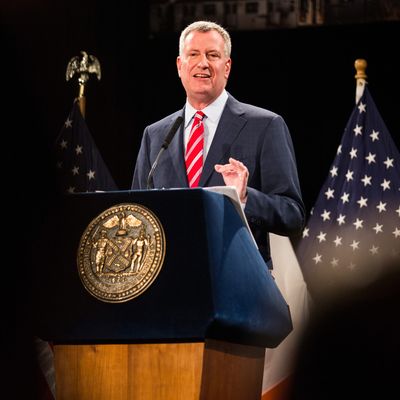
Bill de Blasio presented his second budget proposal as mayor this afternoon, and the $77.7 billion package contained plenty of worthy spending, on everything from solar energy to updated bulletproof vests. It was also a deeper expression of de Blasio’s progressive values, even more so than his first-year budget.
So the mayor is proposing an increase of $28 million in rental assistance. He’s sending an additional $29 million to community college science and technology programs. There’s $18 million in new money to reduce ambulance response times, particularly in poorer neighborhoods. Altogether the new spending is a fairly modest $326 million; de Blasio is also setting aside hundreds of millions in two reserve funds.
How the mayor chooses to spend the taxpayers’ money is important, of course. What’s just as interesting is that the money has kept rolling in.
City tax revenue for fiscal year 2015 is projected to be $5 billion higher than in 2014. Much of that gain is owed to factors outside the mayor’s control, things like the slow, steady uptick in the national economy. Locally, though, the growth comes with a fascinating political subtext. The city has gone from its most pro-business mayor ever to one who is viewed with contempt by many corporate leaders. Yet more than one year into the reign of Comrade de Blasio, billionaires and businesses have not fled. Instead, unemployment has declined to 6.3 percent, its lowest level since October of 2008. “Depending on your perspective,” a budget analyst says, “you could say it’s on the fumes of Bloomberg or that de Blasio has kept things going.”
You know which one the current mayor picks. De Blasio argues that he’s proving it’s possible to be both socially enlightened and fiscally responsible, and that he’s maintaining or improving the fundamentals under-girding the city’s economic health, especially public safety. The mayor has helped make the tax code fairer to some businesses, and says he’ll help them further with streamlined building inspections. He has enthusiastically backed the construction of a tech campus on Roosevelt Island.
Beyond that, though, the city’s economy is expanding without much overt help or cheerleading from de Blasio — in stark contrast to Michael Bloomberg, who saw himself as a one-man Chamber of Commerce.
For many in the business community, de Blasio’s greatest contribution has been that he hasn’t turned out to be the radical socialist they feared. First Deputy Mayor Tony Shorris, who has experience and friends in the private sector, has become something of an emissary to the business crowd skeptical of his boss. “What do they care about? Mostly they want to do their business and make money,” Shorris says. “So, ‘Don’t raise my taxes and keep the city safe.’ What did they get? No taxes raised and a city that was safer than last year. And they’d like the school system to be better.”
Wall Street remains the primary source of city budget cash. But as the financial sector’s share of the local economy continues to shrink — especially its share of the job market — attracting and retaining industries that pay meaningful wages will become ever more important. “Unfortunately business, particularly big business, still thinks his message is that they are part of the problem and not the solution,” a private sector leader says. “In the long run, that is worrisome.”
The mayor, in a variation on his “tale of two cities” theme, today described a “tale of two economies.” By spending cash while times are flush, de Blasio can ameliorate some of the pain at the lower end. Creating a surplus of middle-class jobs, though, may require him to be a little more like Mike.





























